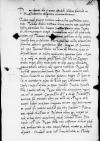Reverendissime Domine, domine et amice observande.
Salutem plurimam ac studiorum diligentem commendationem.
Quam quod propter veterem nostram ac bene constitutam amicitiam Reverendissimam Dominationem Vestram litteris invisere saepe constitutum habui, maxume hoc tempore facerem, servitor meus ⌊Iacobus ab Allexwangen⌋ oravit. Quam ob rem nihil est, quod aeque cupiam, nisi Reverendissimam Do[minat]ionem Vestram in hac corporis senecta bene et feliciter valere, quae quam multis adimere, ita pluribus afferre aegritudinem solet.
Magna est ⌊servitoris⌋ nostri erga Reverendissimam Dominationem Vestram observantia, quam non dissimulanter et multis argumentis cognitam habeo. Qua re a nobis in ⌊patriam⌋ profecturum sine litteris ad Reverendissimam Dominationem Vestram abire nolui, quin ut aliis amicis observandis commendatum adeoque eius negotia reddidi. Reverendissimae Dominationi Vestrae commendatissimus esset.
Deinde amanter oratam, velim, clementiam ac usitatam pietatem benigne ⌊illi⌋ locare velit in controversia, quam de ecclesia pagi ⌊Lichtenau⌋ habet, cuius exspectationem ac spem terrarum Prussiae spectabilis ⌊senatus⌋ adeoque Reverendissimae Dominationis Vestrae intercessione ingressus est et accepit. Conquestus est a magnifico ⌊palatino Pomeraniae⌋ sibi praereptam alteri, qui nullum ius a regia maiestate acceptum habuit, concessam. Benignam operam, rogo, interponat, ne quid ⌊illi⌋ iniuriae accidat, suo iure fraudetur. ⌊Piotrcoviae⌋ apud dictum dominum ⌊palatinum⌋ idem egi, recepit se ⌊eius⌋ rebus iterum consulturum, quod lubenter fieri velim. Praecipuum est, cur Reverendissima Dominatio Vestra sustinere debeat, quod eius auctoritate in eam exspectationem renitit ac colende observet.
Quod meae est benevolentiae ac studii, parem amicam operam, ferente occasione, lubenter iterum declarabo. Ac Reverendissimam Dominationem Vestram Deo Servatori diutissime incolumem commendatam volo.


